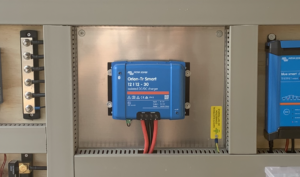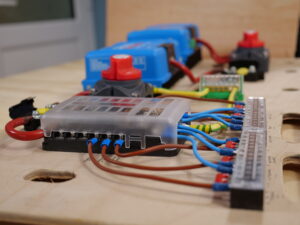Campervan Heating 101 [Ultimate Beginners Guide!]
last updated: Aug 20, 2023
For anyone planning on spending the winter in their campervan, the question of campervan heating is going to be paramount.
There is really nothing quite like climbing inside your warm, cozy, heated campervan after a day out on the slopes, or wandering around snowy holiday markets.
The question you may be asking yourself however is, “How do I heat my campervan?”
We’ve got answers for you!
There are multiple ways to safely heat your campervan, and we’re going to cover them all in this comprehensive campervan heating guide.
Let’s get down to it!

Important considerations before we get started
Campervan heating might not be the first thing that comes to your mind when it comes to converting a campervan, but it’s nevertheless important for anyone planning on taking their van to any location with cooler temperatures.
Before we jump into this campervan heating guide, there are a few important questions to consider regarding heating a van.
Do you really need heating in your campervan?
The very first element to consider regarding campervan heating is whether or not you even need van heating in the first place!
If you’re planning on living in your campervan exclusively in the summers in warm countries, there is probably no need for campervan heating.
However, for van adventures in cooler destinations, having heating in the van is likely going to be a must-have.
How will campervan heating affect fuel costs?
Those concerned about saving money while traveling in a van, or anyone trying to work out their budget for van life, might be wondering how expensive it is to have campervan heating.
The good news is, it’s possible to have a cozy warm heated campervan for very cheap- it just depends on the type of campervan heating you opt for.
After the upfront costs or purchasing the heater itself, fuel used for heating such as LPG is not terribly expensive.
One particularly budget-friendly heating option for some may be a wood stove. If you are traveling in a place where you can find firewood for free, then your fuel costs will be zero!
You will just need to worry about the initial cost of the wood burner.
How to safely install campervan heating
How to safely install campervan heating is by far the most important consideration on this list.
Additionally, there is really only one good answer to this question- your campervan heating installation should be done with the help and supervision of a professional!
No matter the cost, safety is a priority when it comes to installing any system of campervan heating, so be sure to have a professional either install your heating system, or supervise the installation of it.
One very important factor to check for is to be sure that the exhaust vent has a safe outlet out of the van, and remains unblocked by dirt and debris.
Further, it is important to install a smoke detector and carbon monoxide detector along with your heating system to keep yourself, and others safe!
What size heater do you need?
A variety of factors affects what size heater you’ll need, including van size, how much you’ll be running the heater, what temperatures you plan to take the van in, the quality of your insulation, and even how many windows you have in your van.
If you have a smaller van where you plan to run the heater only sparingly, you won’t need as large a heater as someone with a larger van who will be running the heater nonstop in the winter months.
Plus, some campervan heating options have timer and thermostat settings. These settings make it easier to control the temperature inside your van and make more efficient use out of your fuel.
What is your heating backup plan?
Sometimes heaters fail, and it’s important to have a good heating backup plan in case your campervan’s heating system ever fails.
When heating a campervan in winter, you really don’t want to be left high and dry without a heat source.
Investing in quality insulation in your van is one solid way to retain your van’s heat in case the heating system ever fails.
Another good backup heating system is to have plenty of warm blankets in the van to keep you warm if the heating system ever does fail.
Additionally, if you have a campervan water heater, you can also fill water bottles with hot water to keep yourself warm in a pinch.
The Different Main Types of Campervan Heating
In this post we will be covering the four main ways to heat a campervan. Each method varies slightly and some will be better than others for different people.
And, while some methods may be more popular than others, we are going to lay out all pros and cons of each campervan heating method.
That way, you can decide for yourself which method will work best for you and then implement it into your own campervan conversion!
Diesel Heating
How it Works
Diesel heaters for campervans pull fuel from your campervan’s fuel tank, and a small amount of electricity from your van’s battery to heat your van.
They then pull air into the heating unit, and heats that air through a combustion process.
Then, the now heated air is blown back into your campervan through the diesel heater’s van.
Pros of Diesel Heating
Diesel campervan heaters are one of the best and most popular campervan heating options, and with good reason! They are:
- Inexpensive to run.
Diesel heaters use a relatively low amount of fuel and electricity compared to other heating options.
- A reliable source of heat.
Even if it is well below freezing outside, a diesel heater can very quickly warm up the van with ease.
- They have lots of safety features.
Diesel heaters have become one of the most widely used options for campervan heating, and it’s likely because they have so many safety features!
For extra safety, diesel heaters are armed with automatic shutdown features, produce very low levels of carbon monoxide, and have minor levels of exhaust fumes.
- They can pull fuel from your van’s fuel tank, or you can install a separate tank like they did just for your heater!

Cons of Diesel Heating
Even though diesel heaters are a widely used and popular campervan heating option, they are not without their cons, which include:
- An expensive upfront cost.
While it is true that fuel costs of diesel heaters are low, they are still accompanied by an initial expensive upfront cost.
Traditional diesel heaters are incredibly expensive. However, do not despair!
Over the past few years, China has started to make diesel heaters, known as Chinese Diesel Heaters.
These Chinese Diesel Heaters are much more affordable than their counterparts, and have really opened up the market for affordable diesel heater options.
- Diesel heaters are noisier than gas heaters.
While not overly noisy, diesel heaters are certainly louder than their gas counterparts. This could be problematic when trying to stealth camp, or even for light sleepers.
Who are Diesel Heaters Best For?
Diesel heaters are a great campervan heating solution for those who want a safe and reliable source of heat in their campervan!
They are also great camper van heaters for those worried about having access to other fuel sources such as firewood, electricity, or natural gas.
However, if your van happens to not run on diesel, and you are in an area where there is not a widespread availability of diesel fuel, then this may not be the best heating option for you.
The Best Diesel Heaters for Campervan Heating
If after reading through the pros and cons of diesel heaters, you’ve decided to invest in one, congratulations! They are a great heating option.
If you’re looking to purchase one, here are a few good options:
This Chinese diesel night heater is not only affordable, but it is also small and very easy to install.
It’s a great diesel heater campervan option, and is also an affordable alternative to other pricier options.
This diesel heater is both affordable and powerful. With this heater, heating your van will be an absolute breeze.
While this is definitely one of the pricier options for Diesel Heaters, it’s hard to beat the quality here. Plus, this heater can run for 22 hours on one gallon of fuel alone!
Wood Burner

Wood stoves are another popular heating option for campervans.
They are simple to use, and there is something quite lovely about having a wood stove burning and crackling within a campervan.

How it Works
Wood burner campervan heaters work quite simply.
They provide a space to contain a small fire, and the heat from the woodfire radiates out and heats the van.
The structure of the stove keeps the flame contained, and allows the smoke to exit the van from a chimney!
Pros of a Wood Burner
Wood burners are not the most practical campervan heating options, but they are growing in popularity for a number of reasons, including:
- Wood burners give the campervan a cozy and homey feel.
There’s nothing quite like cozying up to an actual fire to warm up in your campervan! Plus, the woodstoves themselves are quite lovely and add a great rustic aesthetic to any campervan.
- Low fuel costs.
Wood is inexpensive, especially if you are in a forested area where you can find wood to burn for free!
**Always be sure to burn dry wood. Damp wood will create a lot of smoke, which will very quickly dirty your chimney and be unpleasant to breathe in.
Cons of a wood burner
While a wood burner can be a wonderful option for campervan heating (as well as a great piece of decor in your van), they are not without their downsides, including:
- A wood burner can make it difficult to insure your van.
Installing a wood burner in your campervan may invalidate your insurance and/or be illegal depending on where you are and what insurance you have.
It is very important to do your research before installing a wood burner into your van to be sure that it’s legal, as well as covered by your insurance.
You don’t want to invest in, and take the time to install a beautiful wood burner in your van and then later down the road realize that it won’t be covered by insurance.
- There is a fire risk.
Due to the nature of having an open flame in your campervan, there is an inherent fire risk in having a wood burner in your campervan.
With that said, the risk is certainly low, and it is always important to take the proper precautions like using the stove correctly, keeping flammable items away from it, and keeping it clean.
- They take up a lot of space.
Wood burners are quite large, and they require clear space around them to be used safely. They also take up a large amount of vertical space for the chimney.
- They will take some time to heat up your van.
Unlike diesel and natural gas heaters, you can’t just flick a switch on a wood burner and have it instantly heat up your van.
It takes a little time and skill to build a fire and get it going to the point where it will actually start to heat up your van.
Plus, fires won’t stay burning through the night so you may have to wake up in the middle of the night and add some wood to the fire if the flame goes out.
- Loss of stealthiness.
The smoke from the wood burner is going to need a space to exit your van, and it will do so from a flue pipe that needs to go through the roof of your van.
Essentially having a chimney coming out of the top of your van will most likely lower your van’s stealth factor, and make it a little more obvious that someone is living in the van.
- High carbon monoxide poisoning risk.
As lovely as they are, wood burners pose a much higher risk of carbon monoxide poisoning than other campervan heating options. It is incredibly important to have proper ventilation if you install a wood burner in your campervan.
Who are Wood Burners Best For?
Due to their large size, wood burners are the best campervan heating option for those with large campervans.
Wood burners are also a great van heating option for those with plenty of access to firewood, so they have a free fuel source!
Wood burners are also great for those who want to have a warm and cozy fire going inside their van- as long as they are sure they can still have their van insured with a wood burner inside!
The Best Wood Burners for Campervan Heating

If you’ve decided to opt for a wood stove to keep your campervan warm at night, we have a few of the most popular options listed here:
One of the biggest drawbacks of a wood stove for campervan heating is the amount of space a wood stove utilizes. The Cubic Mini helps mitigate this issue.
This tiny wood stove won’t take up a ton of space in your campervan conversion, but it will certainly keep it warm!
The Dwarf 3kw campervan wood burner is the smallest wood stove in the dwarf series, and is the perfect size to warm up a campervan! The heater’s body is made from cast iron and is highly durable.
LPG Heater
LPG heaters are another option to heat your campervan, and they are incredibly popular.
**Note: If stored inside your campervan, your gas tank must be held in a sealed container with proper ventilation to the outside of your camper van.
Keep in mind, this is the only safe and legal way to store a gas canister on the inside of your campervan!
How it Works
LPG campervan heaters work by utilizing natural gas to create heat through a combustion process- similar to diesel heaters!
The key difference between these two types of heaters is the fuel type itself. LPG stands for liquified petroleum gas, which is what fuels these heaters.
They require a tank of LPG, and then the natural gas mixes with air inside the heater which then ignites, thus starting the combustion process.
The combustion process creates heat, which heats up the heat exchanger in the heater.
Then, a fan in the heater draws outside air in, heats it up in the heat exchanger, and then blows out of the LPG heater into your campervan- thus making the van warmer!
Different Methods for LPG Heaters
One of the nice aspects of the LPG heating system is that there are a variety of ways to install it.
The two most common ways of installing LPG heating into a van are with a refillable gas canister, or with an underslung gas tank.
The refillable gas canister will need to be located in a separate gas isolation tank in the van, where it is safe from any leaks.
This system is more affordable, but will take up more space in the van.
With an underslung gas canister, the gas isn’t inside your van which is nice for safety reasons, and it isn’t taking up any precious space in the van.
Running at several hundred dollars for this system (at minimum) it certainly isn’t cheap, but many say their underslung gas canister was a key part of their campervan conversion.
Pros of LPG Heaters
LPG Heaters are one of the most popular methods for heating a campervan, and with good reasons! LPG heaters:
- Utilize an inexpensive fuel source.
LPG is not that expensive, especially compared to an electric heat source! For example, a propane refill will run at about $2-$4 a gallon.
- Can heat the van quickly.
With the simple flick of a switch, you can heat your campervan with a LPG heater. This is far more convenient than a system like a wood stove, where you have to actually build the fire itself to provide heat to your campervan.
- Can be mounted underneath your van.
The ability to be mounted externally frees up a lot of precious space in your campervan! Plus, storing the gas tank outside the van offers a little extra peace of mind while running your van heater.
- Pulls from a gas tank you already use.
If you are already using natural gas to heat your van’s water and power your stove, then you can use the same gas tank to also heat your van!
Then, you can have campervan heating and hot water from the same source, which is not only convenient but also will save space in your campervan.
Cons of LPG Heaters
While LPG heaters have plenty of pros, they are not without a few disadvantages, including:
- They can be expensive to install.
LPG heaters, namely an underslung heating tank will require some larger upfront installation costs.
- Fuel for refill is not always available.
During travel, LPG is not always going to be readily available for a refill, and will require a little bit of advanced planning.
- The safety risk of having gas aboard your campervan.
With today’s safety technologies in place, the risk of a leak is low, but not nonexistent.
This is why it is always important to have a professional install and/or supervise the installation of a campervan’s gas system!
Who are LPG Heaters Best For?
An LPG heater is the best camper heating option for anyone who wants an inexpensive fuel cost, simple heating method and wants to power additional appliances with LPG.
LPG is also a great heating option for those taking their van into extreme temperatures. LPG is more reliable than other heating options, and has a much lower freezing temperature than diesel.
Additionally, LPG burns very clean and is a more environmentally friendly option than diesel.
For anyone already utilizing natural gas to power their stove, heat their water, or run any other elements of their campervan, this is also the best campervan heating option.
Having everything in your van powered by the same fuel source is not only very convenient, but saves a ton of space!
Just be sure to invest in a large gas canister, or have frequent access for refills if you go this route.
The Best LPG Gas Heaters for Campervan Heating
If you’ve decided to invest in a LPG heater for your campervan, we have a few recommendations:
This campervan heating option is one of the best on the market. It requires a 12V power hookup to run its fan and thermostat, and a gas supply to power the heating process.
However, this campervan heater uses very little electricity, so it is a great campervan heating option for anyone looking to get off-grid.
The main downside to this heater is its high price point- although it is well worth the quality.
For a more budget-friendly option, there is the Mr. Heater campervan natural gas heater!
This little heater is small, safe, easy to use, and won’t break the bank either.
Overall, the Little Buddy is a great night heater for campervan option.
Electric Heaters
Electric heaters are the least popular way to heat a campervan, although they are still worth mentioning!
Their lack of popularity stems from the fact that they use a lot of power to run, and it really isn’t sustainable for long term van heating.
However, for vans parked and hooked up to a main, electric heaters can be a quick and convenient heating option.
How it Works
When a campervan electrical heater is plugged in, an electrical current flows into the heating unit and heats up the electrical coils within.
Then, the heater draws cold air into the unit, heats up, and is blown back out via a fan into the air, thus warming up your van!
Pros of Electric Heating
While an electric heater isn’t usually the go to for campervan heating, it still has a few pros, including:
- It will quickly heat your campervan.
Electric heaters work lightning fast- at the touch of a button, you can have a cozy and warm campervan without the hassles of a gas tank, or needing to build a fire.
- You won’t need to carry any extra fuel to heat your campervan.
With an electric heater, you can have heat in your van at the touch of a button- as long as it’s hooked up.
- They are extra safe.
With an electric heater, there isn’t the risk of an open flame or carbon monoxide.
Cons of Electric Heating
While electric heaters provide heat quickly, there are a few reasons why they aren’t widely used in campervans, including:
- They will very quickly drain your electricity.
Electric heaters need a ton of electricity to operate, so they are not a great campervan heating option for anyone looking to get off-grid in their campervan, or who isn’t hooked up to a main power source.
- Electric heaters can be bad for your air quality.
Without proper ventilation, electric heaters can be the cause of poor air quality in your van due to the way they suck all of the moisture and dry the air out through their heating process.
- They are expensive to run.
Even while hooked up to a main, electric heaters will still drastically drive up an electricity bill, and are not as cost effective of a heating option as other methods.
- They can pose a danger if they tip over.
If you opt for an electric campervan heater, it is very important to purchase one that has safety settings where the heating system will turn itself off if it tips over.
This is important because an electric heater tipping over poses the risk of creating a fire, by overheating and igniting whatever surface it falls over onto.
Who are Electric Campervan Heaters Best For?
Electric campervan heaters are best for people who are parking their van somewhere with a main for winter so the high electricity usage is not an issue.
They are also for people who do not mind utilizing a large amount of electricity, and contributing to a costly electric bill.
Electric campervan heaters are also a good idea to serve as a backup secondary heating method in case your primary heating method fails and you need to heat up your van in a pinch!
The Best Electric Heaters for Campervan Heating
While an electric blanket doesn’t heat your entire campervan, the Roadpro Fleece Heated Blanket may be a suitable 12 volt heater for van substitution.
If your campervan’s bed already has heavy duty blankets, then an electric blanket may be all you need to initially warm your bed up enough to be comfortable to sleep in throughout the night.
If you are parking your campervan somewhere for the winter with access to a main power source, this could be the perfect campervan heater for you.
The campervan electric heater is quite powerful and can rapidly heat up your van. It even has a thermostat so you can easily control the temperature in your campervan!
Campervan Heating Guide- Final Thoughts
I hope that this guide has been able to answer any questions you may have about campervan heating.
There are so many great options on the market for keeping your campervan warm, no matter which heating method you opt for.
Everyone has different needs and desires when it comes to campervan heating, so the perfect heating option for someone may be quite different from your ideal campervan heating option.
Whichever heating method you opt for, safety is the number one most important factor to keep in mind.
Always check with a professional to make sure that your heater has been properly installed, and be sure to install the proper safety measures as well, such as carbon monoxide detectors, and utilize leak-proof vaults for any gas tanks stored inside your campervan.
Now that you’ve read about the different methods for campervan heating, which type of campervan heating will you opt for?
Build your own adventure
The guide anyone can use to convert a van into a camper! With over $350 worth of savings inside
Do you want to live vanlife at zero cost?
Nate Murphy knows how to buy vans, convert them quickly and efficiently - use them for years - and then sell them for a profit. This can make vanlife not just free, but profitable!
He has successfully done this for years and he teaches his friends and students to do exactly the same. It is not obvious, but anyone can do it if they have the knowledge!
Join Nate at his free online training (running today) and he will teach you exactly how he does this!


The Van Conversion Guide (14th Edition)
The guide anyone can use to convert a van into a camper! This best-selling guide, now in its 14th Edition, has been used by thousands of people to transform a van into a camper.
- 150+ page eBook
- Helps you convert any kind of van
- Diagrams for all the main systems
- FREE mini-course - 28 video tutorials


